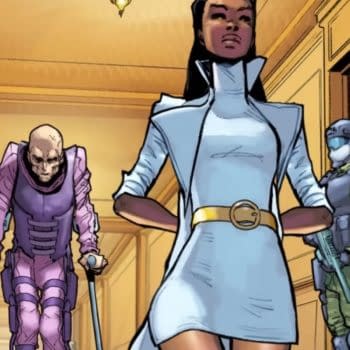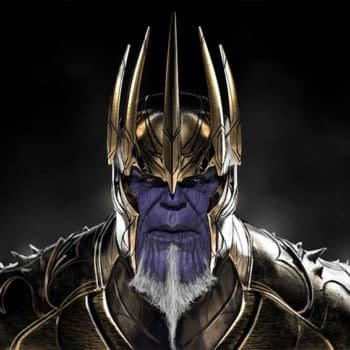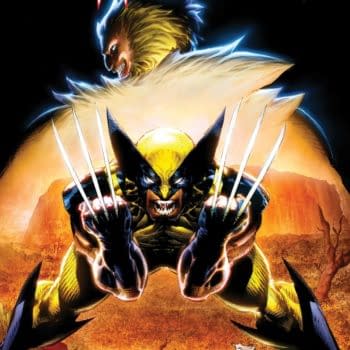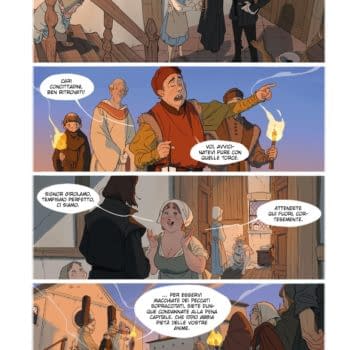Posted in: Comics | Tagged: baltimore comic con, boom studios, Brooke Allen, entertainment, indie Comics, james tynion iv, mark waid, push comics forward
BCC '15: 'Something Amazing Is Happening Right Now' – Boom Celebrates 10 Years & Pushes Comics Forward
Filip Sablik hosted Mark Waid & J.G. Jones (Strange Fruit), Brooke Allen (Lumberjanes), Brian Stelfreeze (Day Men), James Tynion IV (The Woods, upcoming Cognetic), and Dafna Pleban (editor on Planet of the Apes, Sleepy Hollow, Lumberjanes, Wild's End, Lantern City) at Baltimore Comic Con Saturday afternoon.
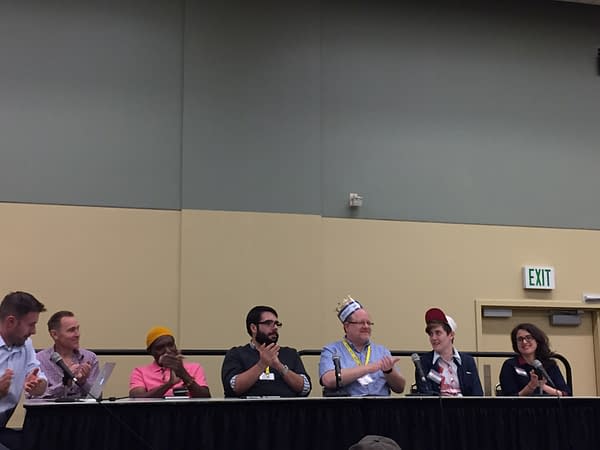
Sablik grew up loving pop culture and saw himself reflected in the comics as a kid due to his immigrant status, among other things. He wants to see his children affected by comics and he wants readers to feel reflected in the comics they read. Comics need to be "accessible", Sablik said. It's important for there to be an "easy entry point" and also stretch the confines of the medium so that there are comics out there for everyone, he said. It's an issue that it's easy to meet people who have never read comics, and needs to continue to be addressed, he added. On behalf of Boom!, Sablik said they are "grateful for the past 10 years" and don't take the support they've received for "granted".

Sablik asked the panelists where they'd like to see the industry go in the next 10 years.
Mark Waid said that things are headed in the right direction, firstly regarding digital distribution. Comics are not accessible in print in many regions. ComiXology and other services bring comics to anyone with internet access now, which is "enormously helpful". As a comic shop owner, he feels we need a larger audience, and digital will help do that. That opens up the audience and will "feed bringing new comic creators to us in the years to come". His observation is that it is "absolutely true" that there is not enough diversity in the creation of comics, and some of that is because for 30 years "we have catered very much to a white male audience". Making comics for a broader audience will help increase awareness of opportunity in the field.
Tynion said some of this change is "already happening". The direct market tends to be the main thing spoken about, but what we're seeing now is a "seismic shift that publishers need to get on top of". The book that should be leading this conversation is the best selling comic in the USA, Raina Telgemeier's Smile. It started with webcomics, he feels, along with the manga boom, when there was an "influx of new comic material that wasn't just superheroes". In that time, a new generation of comics creators started reading, and the influence of art styles come from "everything around them" instead of previous mainstream comics. The next generation of writers and artists are female, Tynion feels, and this will be a "female market". Just like Harry Potter and the Hunger Games books were fuelled in sales by girls, because they read more books than boys at a younger age, comics may follow the same patter because "that's where the readers are".
Pleban said that it's about creating opportunity too. She worked in a comic store, and was always being questioned about her involvement. Comic shops are changing, and instead of saying "YOU like THAT?" to a female reader, they can help them find what appeals to them.
Stelfreeze said that seeing the rise of female readers has been part of his experience, and feels that female readers are also more open to accepting the transgender community, which will lead to more outreach. He feels that you can now "flaunt who you are" in comics rather than conforming to the majority.
Mark Waid commented that there was a point in his career that people wouldn't hire Colleen Doran to draw things because she "draws like a girl" and things have drastically changed. With all respect to superheroes, he prefaced, he also feels that superheroes are much less the center of comics now, which enables more art styles to flourish.
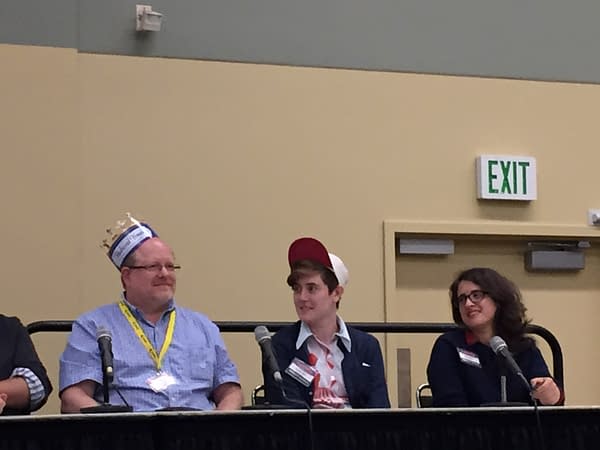
Sablik cited Baltimore Comic Con as a convention expression of being welcoming with the medium, and he asked the panelists if their experiences at the convention showed them a degree of change. He gave the example of seeing fathers bring their daughters up to publishing tables to pick out books.
Allen said she's seen a lot of "whole families" coming and seeing things for everyone there, as well as subverting "what you would expect". Now it's "allowed to be this way", even if it's been this way in the past is the disappearance of gender labels from certain comics. Boys picking up Steven Universe, which has female characters in pastel colors and rounded style, can be surprising. But they do, of course.
Tynion commented that there's the "standard looking comic book fan", an expected kind of fan, going to conventions all over the country. Tynion is expecting Batman comics to be put on the table for signing, but when the fan pulls out a full run of The Woods, he's "taken aback" and realizes the "old guard is shifting". These are things that 10 years ago they wouldn't have expected to pick up in a comic shop, but now they are the popular books.
Stelfreeze said that since things have "opened up", you have comics that don't have fans, so it has to come out and be good in order to generate fans. X-Men is going to "do fine" whether well done or not. They don't have to do much to get 100 thousand people to buy it. But now, all these new comics, without generated fans, have to be good or they will "remain without a single fan".
Sablik said at the Retailers' Summit, he was asked how the publisher "generates the next hit". All the things that have "worked for them" in the past 10 years is to go to the creators and ask what they are passionate about. Mark Waid that this is "critical", and he asks creators what it is about the characters that make them want to create it. If he can't get a clear answer to that question, the answer is "don't publish it".
JG Jones said he wants to work with people with open minds and a variety of content.
Waid asked the audience what they see in comics that excites them that they didn't see in comics 10 years ago.
One female audience member responded that she used to find American comics "intimidating" and a "boy's club" but now feels she can relate and respond to the characters she finds in comics like Lumberjanes and The Woods. She never experienced comics like these growing up, she said, and she feels that what the panelists are creating is making "the comics world better". She added that it's easier to sell these books to reader as a retailer too, since if they don't like superheroes, there are plenty now to offer.

Another female audience member said that she'd love to see "female superheroes over 50" since "some of us have been geeks for a long time". Waid recommended Velvet, though it's not about superheroes. The audience member said that women of a "certain age" are generally under-represented in pop culture and Waid added that it's because they aren't represented enough in making comics, either.
One audience member commented on the role of webcomics. Something he had grown to "expect" in webcomics was "queer representations" and "non monosexual characters". He's finally beginning to see this in print, but not necessarily in the forefront. Still, it's not something he expected to see in comic shops 10 years ago and it's "been great to see that shift".
Sablik said that comics still have a "long, long way to go" in terms of representation, but it's important "given where we are" that Lumberjanes has come from an all-female team and has an "all-female cast". He'd love to get to the point where it's "a given" and "not a big deal" like in webcomics for characters and creators to be more diverse.










